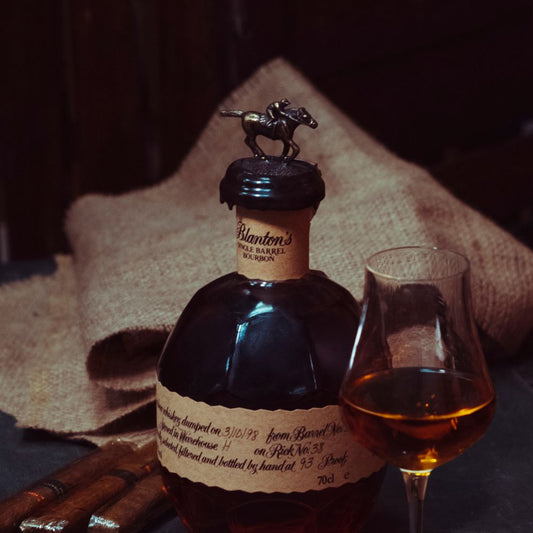Best Whiskey & Cheese Pairings: Guide to Perfectly Matched Flavors

Whiskey and cheese are two of the most beloved indulgences in the world. They each have their own unique flavor profiles and complexities, making them the perfect pair for an unforgettable taste experience. Whether you're a seasoned whiskey connoisseur or a cheese lover looking to branch out, there are countless whiskey and cheese pairings that are sure to delight your taste buds.
Understanding the nuances of whiskey and cheese is the key to creating the perfect pairing. Whiskey can be divided into several categories, each with its own distinct flavor profile, while cheese can range from buttery and mild to sharp and pungent. When pairing whiskey and cheese, it's important to consider the flavor profiles of each and how they complement or contrast with one another.
The art of pairing whiskey and cheese is all about finding the perfect balance between the two. Some pairings work best when the flavors are similar, while others benefit from a contrast of flavors. With so many different types of whiskey and cheese available, there's no shortage of options to explore. So grab a bottle of your favorite whiskey, a few blocks of cheese, and get ready to embark on a delicious journey of taste and discovery.
Key Takeaways
- Understanding the nuances of whiskey and cheese is key to creating the perfect pairing.
- The art of pairing whiskey and cheese is all about finding the perfect balance between the two.
- With so many different types of whiskey and cheese available, there's no shortage of options to explore.
Understanding Whiskey and Cheese
When it comes to pairing whiskey with cheese, there are a few things you should know to make the most out of your experience. Understanding the flavor profile of both whiskey and cheese is crucial to create a perfect match.
Whiskey is a distilled alcoholic beverage made from fermented grain mash. It has a wide range of flavor profiles depending on the distillery, type of grain used, and aging process. Some popular types of whiskey include bourbon, rye, and single malt scotch.
Cheese, on the other hand, is a dairy product made from milk. It also has a wide range of flavor profiles depending on the type of milk used, the region it comes from, and the aging process. Some popular types of cheese include cheddar, brie, and gouda.
When pairing whiskey with cheese, it's important to consider the flavor profile of both. For example, a smoky malt whiskey can pair well with a sharp cheddar cheese, while a sweet bourbon can complement a creamy brie.
It's also important to consider the variety of whiskey and cheese you're pairing. For example, a single malt scotch may pair better with a more complex and aged cheese, while a younger whiskey may pair better with a milder cheese.
Ultimately, the key to a successful whiskey and cheese pairing is experimentation. Try different combinations and take note of what works well for you. With a little bit of knowledge and practice, you can create the perfect pairing for any occasion.
The Art of Pairing
Pairing whiskey and cheese might seem like a daunting task, but it's actually quite simple. The key is to find a balance between the flavors of the whiskey and the cheese. Here are some tips to help you get started:
- Start with a whiskey you enjoy. It's easier to pair a cheese with a whiskey you like than one you don't.
- Consider the flavor profile of the whiskey. Is it sweet, smoky, or spicy? This will help you choose a cheese that complements the whiskey.
- Don't be afraid to experiment. Pairing is all about trial and error, so don't be discouraged if your first attempt isn't perfect.
- Taste the cheese and whiskey separately before pairing them. This will help you identify the individual flavors and aromas of each.
- When tasting, take small sips and bites. This will help you appreciate the nuances of each pairing.
Here are some classic whiskey and cheese pairings to get you started:
| Whiskey | Cheese |
|---|---|
| Bourbon | Cheddar |
| Scotch | Brie |
| Rye | Gouda |
| Irish Whiskey | Blue Cheese |
Remember, these are just suggestions. The beauty of pairing is that there are no hard and fast rules. So, grab your favorite whiskey and cheese, and start experimenting!
Types of Whiskey for Pairing
When it comes to pairing whiskey with cheese, it's important to consider the type of whiskey you're working with. Different types of whiskey have distinct flavor profiles that can either complement or clash with certain cheeses. Here are some of the most common types of whiskey and the cheeses that pair well with them:
Bourbon
Bourbon is a type of American whiskey that is made primarily from corn and aged in charred oak barrels. It has a sweet, smooth flavor with notes of vanilla, caramel, and oak. Bourbon pairs well with creamy, nutty cheeses like Gouda and Havarti, as well as sharp cheddars.
Rye
Rye whiskey is made from a mash of at least 51% rye and aged in charred oak barrels. It has a spicy, peppery flavor with notes of cinnamon and clove. Rye whiskey pairs well with hard, aged cheeses like Parmigiano-Reggiano and Gouda, as well as blue cheeses like Roquefort and Stilton.
Scotch
Scotch is a type of whisky made in Scotland from malted barley and aged in oak barrels. It has a smoky, peaty flavor with notes of honey, heather, and sea salt. Scotch pairs well with strong, pungent cheeses like blue cheese and aged cheddar.
Irish Whiskey
Irish whiskey is made from a blend of malted and unmalted barley and aged in oak barrels. It has a smooth, mellow flavor with notes of honey, vanilla, and caramel. Irish whiskey pairs well with creamy, mild cheeses like Brie and Camembert, as well as sharp cheddars.
Some specific whiskey and cheese pairings to try include Four Roses Small Batch Select with aged cheddar, The Balvenie Caribbean Cask 14 Year Old with Gouda, and Macallan Rare Cask with Délice du Poitou cheese. Remember, the key to a successful whiskey and cheese pairing is balance. You want the flavors of the whiskey and cheese to complement each other without overpowering one another.
Types of Cheese for Pairing
When it comes to pairing whiskey with cheese, there are many types of cheese that work well with different types of whiskey. Here are some of the most popular types of cheese for pairing with whiskey:
Blue Cheese
Blue cheese is a strong and pungent cheese that pairs well with whiskey. Its bold flavor and creamy texture make it an excellent choice for pairing with a variety of whiskey types. Aged blue cheese like Stilton or Roquefort can be paired with smoky and peaty whiskeys like Islay scotch, while younger blue cheese pairs well with bourbon or rye.
Cheddar
Cheddar is a versatile cheese that comes in different varieties, ranging from mild to sharp. Aged cheddar pairs well with peated scotch, while younger cheddar goes well with bourbon or Irish whiskey. The nutty and tangy flavor of cheddar also complements the sweet and spicy notes of whiskey.
Gouda
Gouda is a semi-hard cheese with a nutty and buttery flavor that pairs well with whiskey. The caramel notes in aged Gouda go well with bourbon, while younger Gouda pairs well with Irish whiskey or rye.
Brie
Brie is a soft and creamy cheese with a mild and buttery flavor that pairs well with whiskey. Its creamy texture and subtle flavor make it an excellent choice for pairing with lighter whiskeys like Irish whiskey or bourbon.
Goat Cheese
Goat cheese has a tangy and earthy flavor that pairs well with whiskey. Its creamy texture and subtle flavor make it an excellent choice for pairing with lighter whiskeys like Irish whiskey or bourbon.
Camembert
Camembert is a soft and creamy cheese with a rich and buttery flavor that pairs well with whiskey. Its creamy texture and subtle flavor make it an excellent choice for pairing with lighter whiskeys like Irish whiskey or bourbon.
Cow and Sheep Milk Cheeses
Cow and sheep milk cheeses come in different varieties, ranging from mild to strong. Hard cheeses like Parmigiano Reggiano or Comté pair well with peated scotch, while younger cow or sheep milk cheeses go well with bourbon or Irish whiskey. The nutty and tangy flavor of these cheeses also complements the sweet and spicy notes of whiskey.
Rind Cheese
Rind cheese like Brie de Meaux or Camembert has a soft and creamy texture with a rich and buttery flavor that pairs well with whiskey. The creamy texture and subtle flavor of rind cheese make it an excellent choice for pairing with lighter whiskeys like Irish whiskey or bourbon.
Overall, when it comes to pairing whiskey with cheese, it's important to experiment and find the perfect pairing that suits your taste.
Flavor Profiles to Consider
When it comes to pairing whiskey and cheese, it's important to consider the flavor profiles of both. This will help you create a harmonious balance between the two, rather than having one overpower the other. Here are some flavor profiles to consider:
-
Rich: Cheeses with a rich flavor profile, such as Brie or Camembert, pair well with a smooth and creamy whiskey like Irish whiskey. The creaminess of the whiskey complements the richness of the cheese.
-
Caramel and Nutty: Whiskey with a caramel or nutty flavor profile, such as Bourbon or a sherry-finished Scotch, pairs well with nutty cheeses like Gouda or Cheddar. The sweetness of the whiskey complements the nuttiness of the cheese.
-
Peat and Smoke: Whiskey with a peat or smoke flavor profile, such as Islay Scotch, pairs well with strong and salty cheeses like blue cheese or Roquefort. The smokiness of the whiskey complements the strong flavor of the cheese and if you don't have a smoky whiskey you can always try smoking your whiskey with our drink smoker top.
-
Honey and Vanilla: Whiskey with a honey or vanilla flavor profile, such as Tennessee whiskey or some Bourbons, pairs well with creamy and mild cheeses like Havarti or Monterey Jack. The sweetness of the whiskey complements the creaminess of the cheese.
-
Salt and Fat: Whiskey with a salty or fatty flavor profile, such as some Ryes or Japanese whiskies, pairs well with hard and nutty cheeses like Parmigiano-Reggiano or Manchego. The saltiness of the whiskey complements the nuttiness of the cheese.
-
Chocolate and Pepper Finish: Whiskey with a chocolate or pepper finish, such as some Bourbons or Ryes, pairs well with sharp and tangy cheeses like aged Cheddar or Asiago. The spiciness of the whiskey complements the sharpness of the cheese.
-
Peppery Spice and Tropical Fruit: Whiskey with a peppery spice or tropical fruit flavor profile, such as some Irish whiskeys, pairs well with soft and creamy cheeses like Boursin or Chevre. The fruitiness of the whiskey complements the creaminess of the cheese.
-
Candied Sweetness and Tannic: Whiskey with a candied sweetness or tannic flavor profile, such as some Sherries or Port finished whiskies, pairs well with strong and pungent cheeses like Stilton or Gorgonzola. The sweetness of the whiskey complements the pungency of the cheese.
Consider these flavor profiles when selecting your whiskey and cheese pairings, and you're sure to impress your guests with a harmonious and delicious combination.
Creating the Perfect Pairing
Pairing whiskey and cheese can be a fun and exciting experience. With so many different types of whiskey and cheese available, the possibilities are endless. Here are some tips to help you create the perfect pairing:
Consider the Flavor Profile
When pairing whiskey and cheese, it's important to consider the flavor profile of both. A good rule of thumb is to pair bold cheeses with bold whiskeys and mild cheeses with milder whiskeys. For example, a sharp cheddar pairs well with a smoky bourbon, while a creamy brie pairs well with a smooth Irish whiskey.
Experiment with Different Combinations
Don't be afraid to experiment with different combinations of whiskey and cheese. Try pairing a fruity whiskey with a sharp cheese, or a spicy whiskey with a creamy cheese. You never know what flavor combinations you might discover.
Add Some Accompaniments
To enhance your whiskey and cheese pairing, consider adding some accompaniments. Fruits like apples and pears can add a sweet and tart contrast to the rich flavors of the cheese and whiskey. Nuts like almonds and walnuts can add a crunchy texture and nutty flavor. Crackers and bread can provide a neutral base for the cheese and whiskey.
Consider Your Guests
When creating a whiskey and cheese pairing, consider your guests. If you're hosting a party, make sure to offer a variety of cheeses and whiskeys to cater to different tastes. You can also offer some snacks and desserts to complement the pairing.
Overall, creating the perfect whiskey and cheese pairing is all about experimentation and having fun. Don't be afraid to try new things and discover your own unique flavor combinations.
Get recipes & ideas delivered to your inbox
Sign up for our newsletter to learn about releases, exclusive deals and more!
Recent Articles
- 12 Best Whiskies for an Old Fashioned
- 30 Popular Bourbons You Can Find Almost Anywhere
- What is Whiskey Made Of?
- The Science of Smoke: How Smoking Enhances Your Cocktails
- How to Pair the Right Wood Chips Your Smoked Cocktail
- How to Create a Home Bar Setup
- 10 Best Whiskeys to Stock Your Home Bar or Cart With
- Essential Bar Tools for Smoking a Cocktail
- What Are Good Smoked Cocktail Garnishes?
- Rye Whiskey vs Bourbon: What Are the Main Differences?



